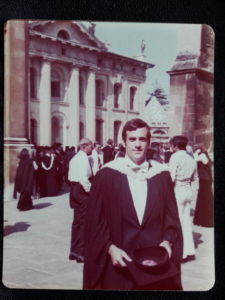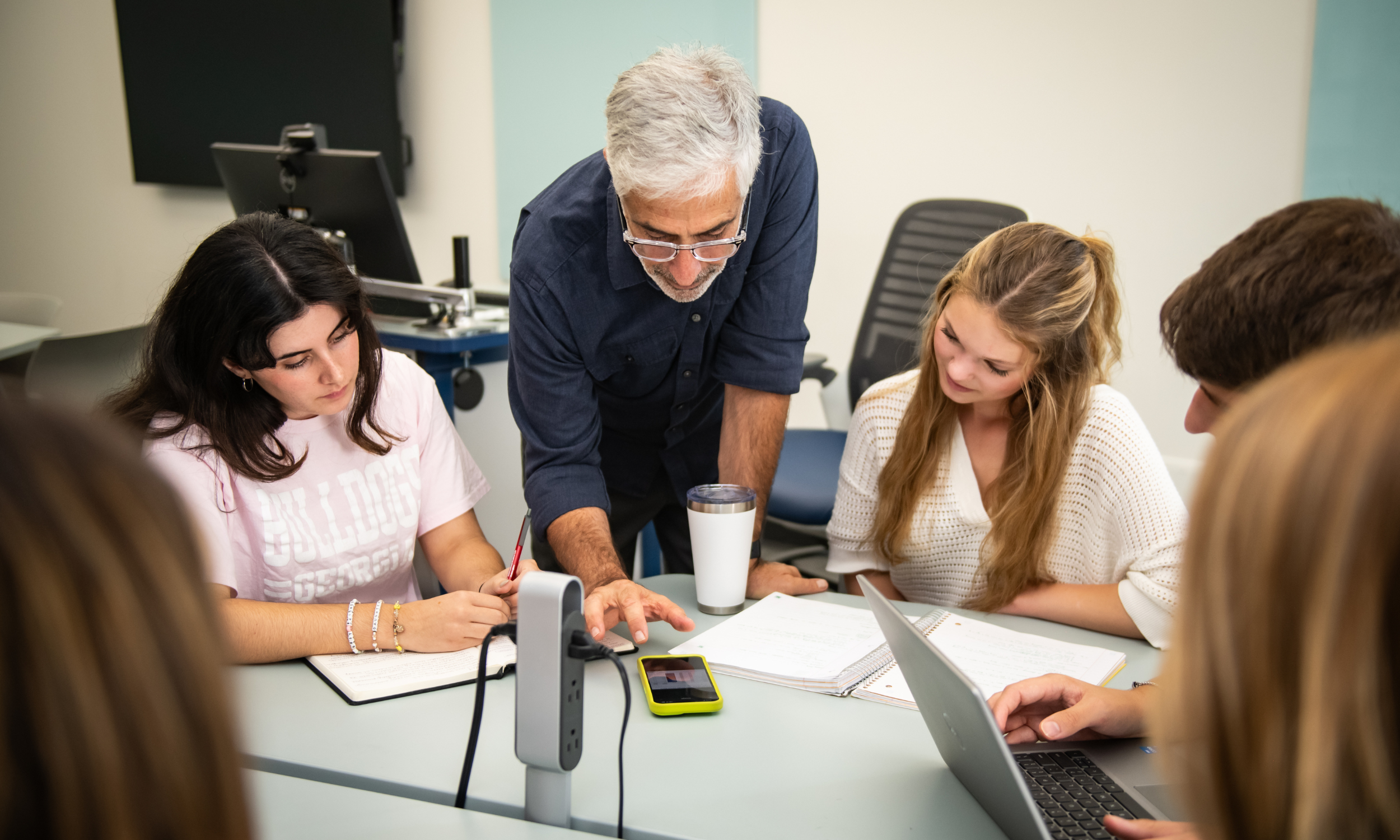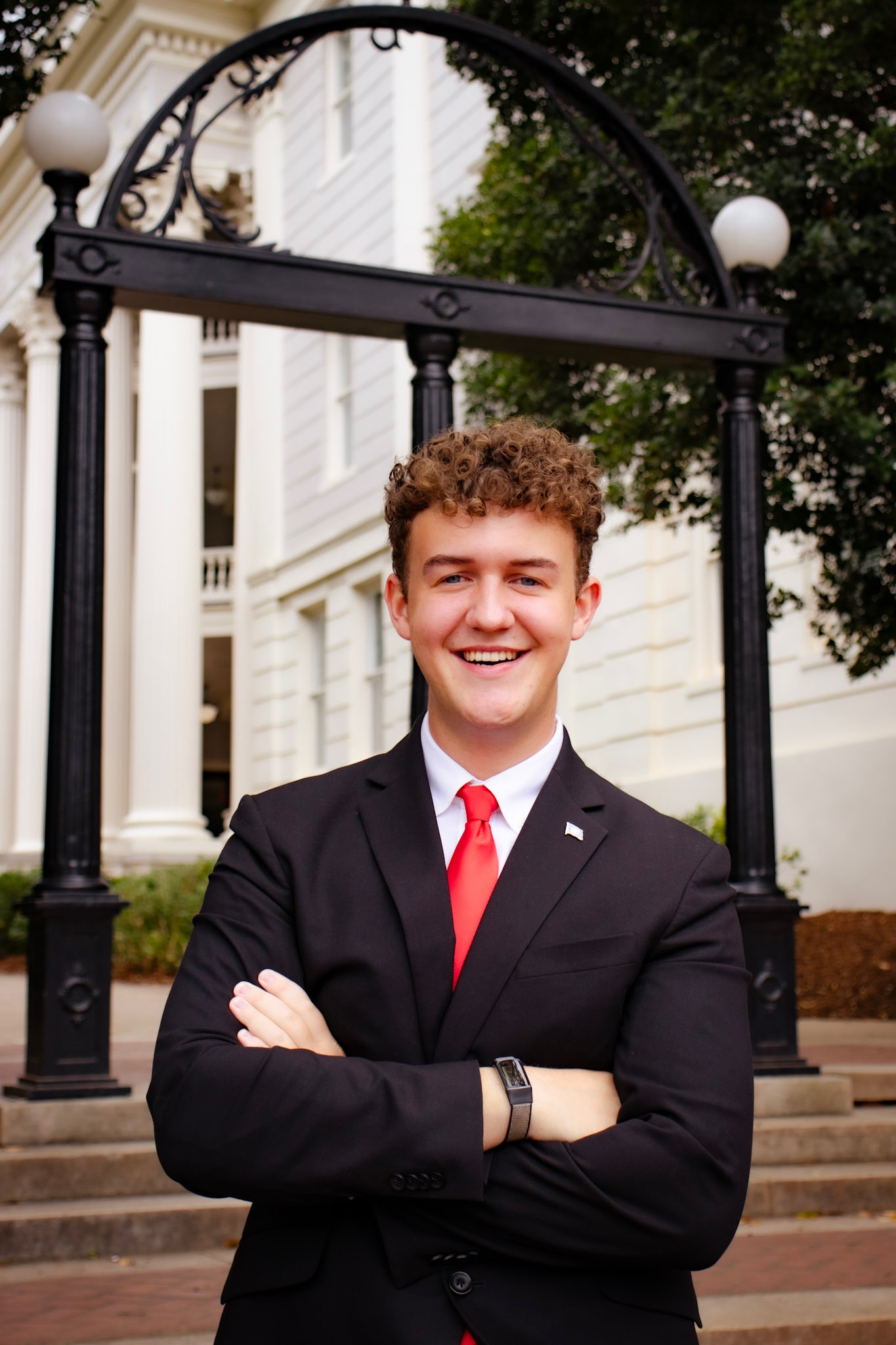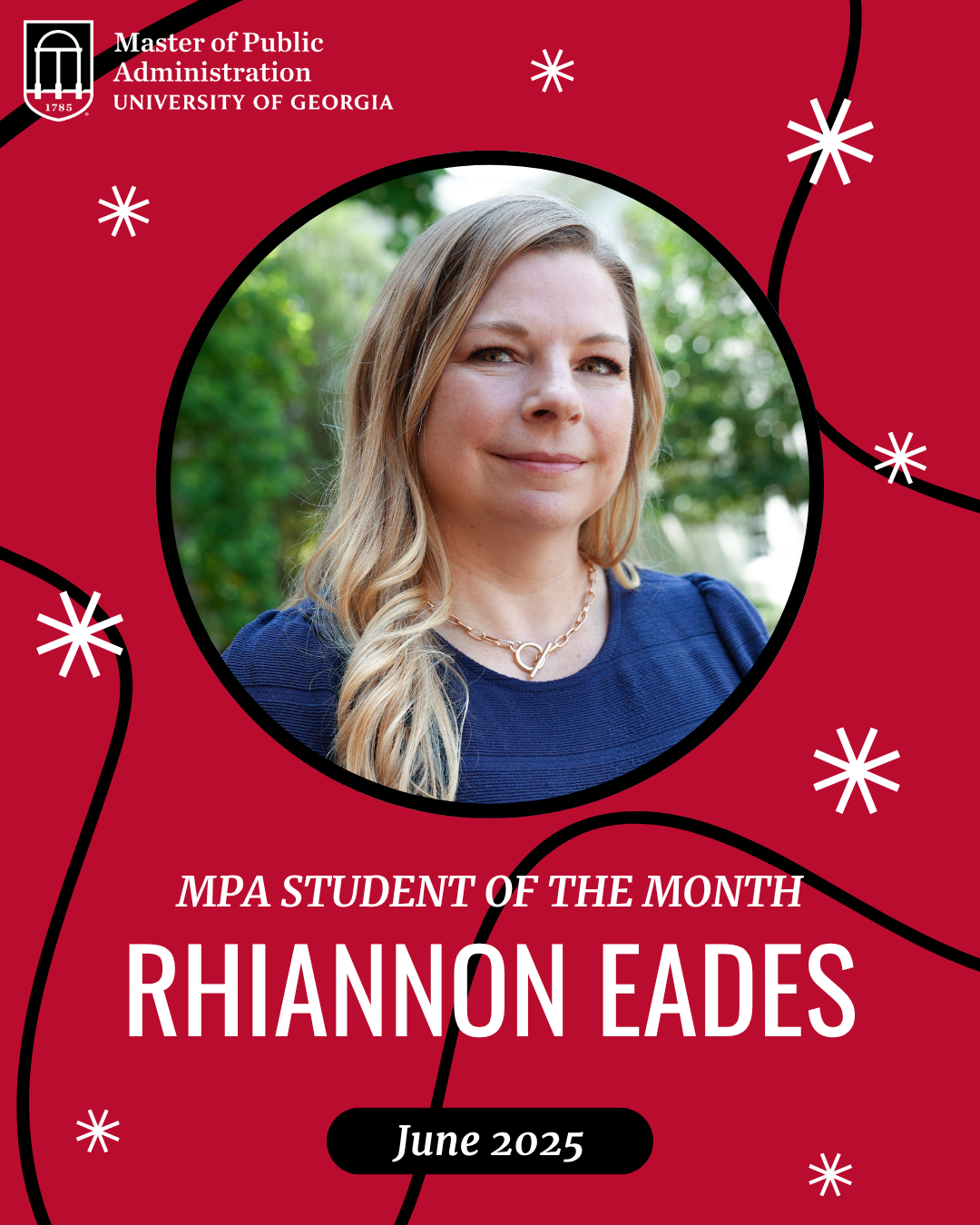
The Rhodes Scholarship was established by Cecil Rhodes upon his death in the early 1900s. Since then, 32 American students have been selected annually as Rhodes Scholars, earning themselves a spot in a post-graduate program at Oxford University. The Rhodes is among the most coveted and distinguished of academic honors.
Since 1973, five SPIA students have been named Rhodes Scholars. To put this into perspective, more Rhodes Scholars have come out of SPIA than have emanated from the entire alumni population of several major public universities in the South and beyond. SPIA’s success in the competition for the Rhodes is testament to the high academic caliber of its students, broadly. We caught up with the five SPIA Rhodes Scholars to see where their passion has taken them since graduation. Here are their stories:
—
Fred Manget graduated in 1973 with a degree in political science, when the department was still part of the Franklin College of Arts and Sciences. He grew up in Dekalb, Georgia, but discovered his love for travel and international relations after his summer abroad in Dijon, France.
“I came back from my summer abroad and decided to pursue a graduate degree,” he said. “Most of the scholarships seemed geared towards careers in academia, but the Rhodes is for well-rounded folks in different areas, so I was attracted to that idea.”
While the interview process for the Rhodes has changed over time, one aspect has remained the same: it is highly competitive. Luckily, competition has always been a part of Fred’s nature.
“When I found out I was awarded the scholarship, I felt lucky,” he said. “Growing up, our family was very competitive, so it was rewarding to be recognized with this premier scholarship. Somehow I squeaked through.”
He earned a master’s degree at Oxford in Philosophy, Politics, and Economics.
Upon his return to the States, he went to law school at Vanderbilt University and joined the Army Reserve Judge Advocate General’s Corps, where he spent 22 years and retired as a Colonel. With a long list of impressive accomplishments to choose from, Fred says he is most proud of his 26-year career in the Central Intelligence Agency.
“I made my way through the Intelligence Service where I was able to contribute at the highest level,” he said.
In addition to his career in government, Fred spent time back at UGA as an Officer in Residence, where he taught classes on strategic intelligence and courses at the School of Law. It was during this time that he met his favorite professor, Dr. Loch Johnson. Although he never took classes with Dr. Johnson, Fred regards him as one of the greatest professors at UGA.
Currently, Fred is enjoying retirement in High Point, North Carolina with his wife, children, and grandson. He offers the following wisdom to current students.
“Don’t give up easily,” he urged. “Everyone has setbacks and disappointments, even the best of the best. You might get the right question in the interview and get further than you think you will, and you might not. Keep at it, and you will do more than you should be able to do.”
—
Scott Hershovitz graduated from UGA in 1998 with double majors in political science and philosophy. Scott credits SPIA faculty as essential to winning a Rhodes.
“UGA is really terrific at preparing people to apply for these scholarships,” he said. “Even when I wasn’t in a small class, I had a lot of faculty [members] that made a difference and got to know me. They gave me great encouragement throughout the process.”
Originally, Scott planned to pursue a master’s degree in philosophy while at Oxford University, but he switched degree programs in his first term, reading for a doctorate in law, a prestigious program home for many of the world’s top philosophers of law.
“There was no better place to study philosophy of law,” he said. “It is such a unique environment with a ton of independence. I developed great relationships with my professors and classmates. And I travelled a lot too. I was able to see a lot of the world in a short period of time.”
After his time at Oxford, Scott earned his Juris Doctorate from Yale University. Throughout his career, Scott has clerked for judges and worked at the United States Justice Department on the Civil Appellate Staff. But the most notable part of his resume is the year he clerked for Supreme Court Associate Justice Ruth Bader Ginsburg.
“For the second time, I was struck by lightning,” he said, referringhis good fortune at being named a Rhodes Scholar and clerking for a Supreme Court justice. “It was a phenomenal experience, but very hard work. I gained a wealth of knowledge and was able to see the court at work from an insider’s perspective.”
Currently, Scott is a professor at the University of Michigan Law School, where he encourages his students to find their passion and throw themselves into it.
“I am most proud of my teaching. I love pushing students to think about law in ways they otherwise might not,” Scott said.
And, he learned from the best.
“Dr. Bullock always took the time to learn each student’s name and career interests, and I try to do the same for my students,” he said. “I find that it’s a really special way for faculty to connect with their students.”
—
Kate Vyborny graduated from UGA in 2005 with degrees in international affairs and economics. Before applying for the Rhodes Scholarship, she worked for three years in Washington, DC, first at the Carnegie Endowment for International Peace and then for the Center for Global Development.
“I admired how the people I worked with who had PhDs were asking the right questions and doing great research,” she said. “I wanted to do something similar, so I decided to go back to school and apply for the Rhodes Scholarship.”
The day she interviewed for the scholarship was a historic one for the University of Georgia and SPIA. Not one, but two SPIA students were named Rhodes Scholars that year.
Kate earned both her master’s and doctorate degrees from the University of Oxford.
Kate is currently a Research Associate in the Department of Economics at Duke University, but she spends the majority of her time in Pakistan. She performs research and impact evaluations of different initiatives that are intended to benefit low-income individuals, empower women, or protect the environment. Her work focuses on urbanization and transportation-related issues. She is part of a team presently performing an experiment in which they run a job search service with nearly 10,000 subscribers to evaluate what factors facilitate employment and what types of constraints affect subscribers’ prospects of employment.
In a related project, Kate examines the impact of a mass transit line, how it influences travel patterns in the city, and whether it has affected urbanization.
“It relates to the first project in that we are testing the impact of transportation, and specifically, for women who are much more constrained to stay at home because it’s not safe in the public area,” she explained. “We are offering a transport service to determine whether that makes an impact on if women apply for jobs outside of the home and obtain employment rather than feeling that they have to stay home because they don’t feel safe traveling alone to work.”
Her ultimate goal is to combine original research with tangible results in order for her work to be directly applicable to policymakers.
“It’s really rewarding when you provide results or statistics that affect policy and change programs going forward,” Kate said.
—
Deep Shah graduated in 2008 with degrees in biology and international affairs. During his junior year at UGA, he earned a Truman Scholarship that enabled him to pursue his passion for public policy. Ultimately, Deep wanted to earn a master’s degree in order to work at the intersection of health policy, medical science, and patient care. The rigorous application process for the Rhodes Scholarship helped him solidify those goals.
“The process encourages you to understand exactly what you want do, why you want to do it, and how you will get there over the course of your career. By the time interview day arrives, you are prepared to have an honest, unapologetic, thoughtful conversation about your life goals,” said Deep.
In 2008, Deep was one of two UGA students awarded the Rhodes Scholarship.
During his time at Oxford he developed close friendships and enjoyed an inspiring and intellectually engaging atmosphere.
“The ethos of Oxford is very interdisciplinary, particularly among the graduate programs. The environment prompts you to engage in discussion across fields in order to develop your understanding of the world,” he said. “The experience afforded me time to read, write, and explore new intellectual avenues. It’s a humbling opportunity that helped me mature as a person and a student. Winning a Rhodes Scholarship was not something that I ever expected, but I will always be grateful for its lasting impact on my life.”
After receiving his master’s degree at Oxford, Deep returned to the States to attend Harvard Medical School (HMS). At HMS, he cemented a commitment to primary care and was selected as Class Day Speaker by his peers. He then returned to Georgia for his residency to study internal medicine at Emory University, where he was named Outstanding Resident all three years. Currently, Deep practices as a primary care physician at Gwinnett Clinic.
“Very little compares to the joy of helping a patient who has perhaps been misdiagnosed or ignored in the past,” Deep said. “Helping a patient achieve better health or an improved quality of life is always rewarding.”
He cites his time at UGA for providing great mentors and unparalleled opportunities.
“I’m the product of a strong system: a loving family, top universities, and the freedom to pursue my interests,” he said. “People often succeed when others believe in them. I am no exception.”
—
Elizabeth Allan graduated in 2012 as a proud SPIA “Double Dawg” with bachelor’s degrees in international affairs, economics, and Aa master’s degree in international policy.
“Coming into the fall of 2012 my original plan was to apply for a language studies scholarship and then go to law school,” she said. “One of my professors mentioned the Rhodes Scholarship, and it got me excited to spend another two years ‘nerding out’ in Oxford.”
The Rhodes Scholarship gave Elizabeth a new perspective on her focus area: the Middle East. While studying for her master’s degree in Middle Eastern Studies, Elizabeth was granted the opportunity to live in various countries during her breaks from school.
“For me, one benefit of being in the UK was that I was only a short plane ride away from most Middle Eastern countries and got to study there and engage with that part of the world while doing research,” she said.
She lived in Cairo and Jordan for weeks at a time while pursuing her master’s degree, and after graduation, she worked with Syrian and Iraqi refugees in Jordan. She then worked for McKinsey & Company, a global management consulting firm, in their Middle East office in Dubai. This position enabled her to be employed and live in Saudi Arabia and Sierra Leone, among other locations. Her work in Sierra Leone primarily focused on creating data driven systems that enabled better decision-making processes, specifically during rebuilding after the devastating impact of Ebola. Her passion for international development continues to inform her career goals.
Currently, Elizabeth is a first-year student at Yale Law School.
“We should each identify an area where we can be most effective, so I’m going to law school to have the experience and skills to do well in my area,” she said. “I want to help shape a sustainable and inclusive US foreign policy in treaties, trade agreements, and foreign investments, specifically with less developed countries.”
As an undergraduate, Elizabeth took the time to invest in relationships with other SPIA students and professors, and she feels these connections helped her define her passion early on in her studies.
“Doing something that I love and that I believed in was a really critical part of my experience at UGA,” she said. “I would encourage current students to find outlets that inspire them. Achieving positive change in the world requires hard work and teamwork. Be humble in this pursuit, but don’t be afraid to go there.”








